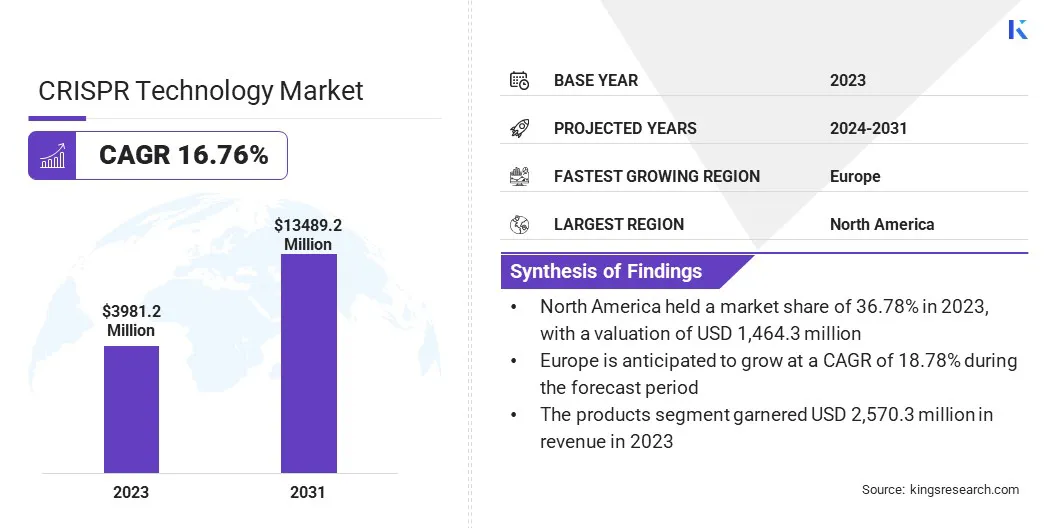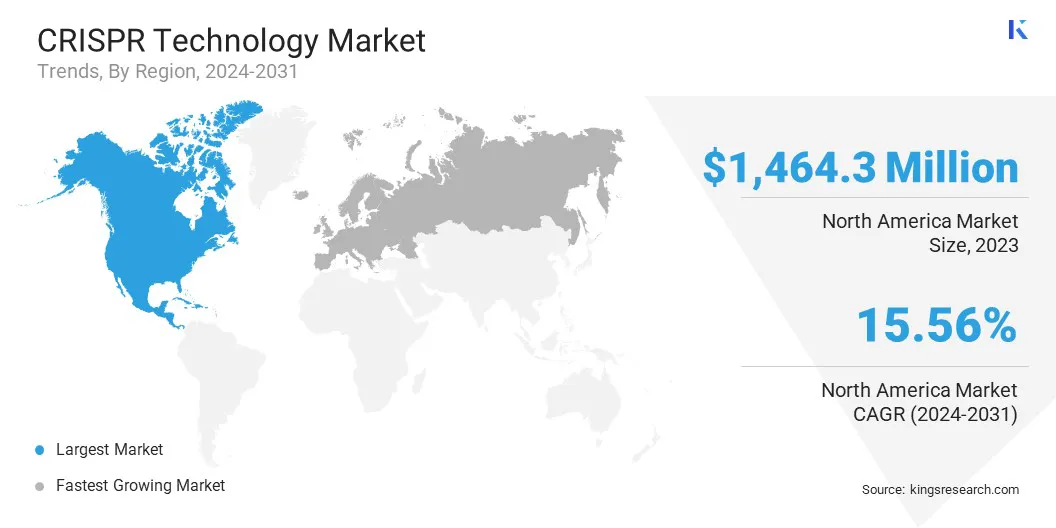CRISPR Technology Market Size
The global CRISPR Technology Market size was valued at USD 3,981.2 million in 2023 and is projected to grow from USD 4,558.8 million in 2024 to USD 13,489.2 million by 2031, exhibiting a CAGR of 16.76% during the forecast period. The market is rapidly evolving with increased applications in therapeutic research and agricultural biotechnology.
Innovations in CRISPR-based tools are enhancing precision and efficiency in genetic manipulation, leading to breakthroughs in disease modeling and crop improvement. The expanding focus on personalized medicine and sustainable agriculture is fueling market growth, supported by rising investments and research activities aimed at optimizing CRISPR technology for diverse applications.
In the scope of work, the report includes solutions offered by companies such as Agilent Technologies, Cellecta Inc., GeneCopoeia Inc., GenScript, Horizon Discovery Ltd, Danaher Corporation (Integrated DNA Technologies (IDT)), Merck KGaA, New England Biolabs, Origene Technologies Inc., Thermo Fisher Scientific, and others.
The CRISPR technology market is experiencing significant growth, driven by advancements in genome editing and improved delivery systems. The introduction of nano-carriers and enhanced delivery methods has significantly improved the efficacy and specificity of CRISPR, leading to its increased adoption in gene and cell therapies, as well as in regenerative medicine.
- For instance, a report published in March 2022 by Molecular Cancer highlighted a notable rise in the use of CRISPR-Cas9 for addressing genetic disorders and cancers, including the correction of gene mutations associated with inherited diseases.
The ease, precision, and expanding applications of CRISPR/Cas9 technology, coupled with these advancements, are propelling its widespread use across various biomedical fields, including regenerative medicine and cancer immunotherapy.
CRISPR technology is a revolutionary genome-editing tool that enables precise modifications of DNA within living organisms. It operates on the CRISPR-Cas9 system, which employs a guide RNA to direct the Cas9 enzyme to a specific DNA sequence, where it creates a double-strand break. This break can then be repaired through various methods, allowing for targeted insertion, deletion, or alteration of genetic material.
Originally discovered as a bacterial immune defense mechanism, CRISPR has been adapted for diverse applications, including genetic research, disease treatment, and agricultural enhancements. Its precision, efficiency, and versatility have made it a fundamental tool in modern biotechnology.

Analyst’s Review
Increasing financial support from both government and private sectors, coupled with the initiation of numerous research projects, is poised to propel advancements in CRISPR technology. This substantial funding is expected to present lucrative growth opportunities.
- For instance, in July 2023, Pfizer invested USD 25 million in Caribou Sciences to support the development of CB-011, a CRISPR-edited allogeneic CAR T-cell therapy that is undergoing Phase 1 trials for the treatment of multiple myeloma.
- Additionally, in October 2023, the Yale School of Medicine secured a USD 40 million grant from the National Institutes of Health (NIH) to develop a CRISPR gene-editing platform for targeting the human brain.
The CRISPR technology market players may leverage increased funding and research grants by focusing on innovative CRISPR applications and advancing clinical trials. Strategic investments in cutting-edge technologies and collaborative projects are projected to enhance their capabilities, drive breakthroughs, and increase market opportunities, positioning them for substantial growth in the coming years.
CRISPR Technology Market Growth Factors
The rising incidence of genetic diseases is significantly propelling the growth of the market. As the prevalence of genetic disorders increases, there is a growing demand for advanced therapeutic solutions capable of addressing the root causes of these conditions. CRISPR technology, with its precision in editing genetic sequences, presents a revolutionary approach to correcting genetic defects and treating previously untreatable diseases.
The potential of this technology boosts investment in research and development, increases the adoption of CRISPR-based therapies, and expands the market for CRISPR tools and services. The technology's potential to transform the treatment landscape and improve patient outcomes is a key factor propelling market expansion.
A significant challenge impeding the development of the CRISPR technology market is the high cost and complexity associated with its development, which limits accessibility and adoption. These factors hinder market growth by restricting the number of researchers and institutions capable of utilizing CRISPR technologies effectively.
Additionally, regulatory hurdles and ethical concerns regarding gene editing contribute to uncertainties and result in delays in the approval processes. To mitigate these challenges, key players are investing heavily in more cost-effective and efficient development techniques, fostering collaborations to share resources and expertise, and actively engaging with regulatory bodies to streamline approval processes.These efforts aim to lower costs, accelerate market entry, and address ethical concerns, thereby supporting market expansion.
CRISPR Technology Market Trends
CRISPR technology is advancing genome editing across the fields of medicine, biotechnology, and agriculture, thereby facilitating faster and more efficient research.
- For instance, a report published by Nature Publications in November 2022 highlighted that CRISPR gene editing can be utilized to modify patients' immune cells, specifically T cells, to target disease-causing proteins present in solid tumors. This development builds upon previous research focused on enhancing T cell specificity through transgenic TCR engineering.
The accessibility and cost-effectiveness of CRISPR tools, combined with their potential for next-generation applications, are increasing the demand for this technology.
CRISPR-Cas9 technology is revolutionizing the field of genetic research by enabling precise DNA editing within cells, which holds significant potential for addressing a range of diseases. This technology allows for the correction of genetic mutations associated with inherited conditions such as eye diseases and neurodegenerative disorders such as Alzheimer's and Huntington's.
Additionally, it addresses non-hereditary diseases, including cancer and HIV. By targeting specific genes associated with these diseases, CRISPR technology offers the potential for both therapeutic interventions and preventive strategies at the genetic level.
- For instance, a study published by Springer Nature in March 2023 highlighted the rapid advancement of CRISPR-based genome editing, showcasing the expansion of the CRISPR-Cas toolkit with new Cas orthologs, engineered variants, and transposon-associated RNA-guided systems.
This trend underscores the growing capabilities and applications of CRISPR technology, leading to its widespread adoption in research and therapeutic development.
Segmentation Analysis
The global market is segmented based on type, application, end user, and geography.
By Type
Based on type, the market is categorized into products and services. The products segment led the CRISPR technology market in 2023, reaching a valuation of USD 2,570.3 million. The availability of advanced CRISPR kits, vectors, and engineered components facilitates more efficient and precise gene editing, thereby promoting widespread adoption in both research and clinical applications.
As researchers and institutions utilize these products to explore new applications and improve existing techniques, the demand for high-quality, reliable CRISPR products is increasing. This growth is further fueled by continuous product development, including the introduction of novel CRISPR variants and delivery systems. The expansion of product offerings enhances research capabilities and accelerates the advancement of CRISPR-based therapies, thereby contributing to segmental expansion.
By Application
Based on application, the market is categorized into drug discovery, agriculture, and others. The drug discovery segment captured the largest CRISPR technology market share of 65.56% in 2023. CRISPR's precision in gene editing significantly accelerates drug discovery processes by enabling researchers to create accurate disease models and identify potential therapeutic targets more efficiently.
This efficiency reduces development timelines and costs, making drug discovery faster and more cost-effective. Additionally, CRISPR technology aids in the identification and validation of novel drug targets, thereby increasing the potential for breakthrough therapies.
The rising focus on integrating CRISPR technology into high-throughput screening and preclinical studies expands its applications in drug discovery, leading to a broader range of drug candidates. The continued innovation and application of CRISPR technology in drug discovery underscore its critical role in advancing pharmaceutical research and development.
By End-User
Based on end-user, the market is categorized into pharmaceutical company, academic & research institutes, and others. The pharmaceutical company segment is expected to garner the highest revenue of USD 10,174.6 million by 2031.
Pharmaceutical firms are leveraging CRISPR technology to develop groundbreaking therapies and address complex genetic disorders, which expands their product portfolios and strengthens market position. By integrating CRISPR into drug discovery and development, these companies accelerate the creation of targeted treatments and personalized medicine solutions.
Their focus on advancing clinical trials, coupled with collaborations and partnerships, enhance both the applications and effectiveness of the technology. The commitment to exploring novel CRISPR applications, including gene editing for rare and chronic diseases, fuels continuous segmental expansion.
CRISPR Technology Market Regional Analysis
Based on region, the global market is classified into North America, Europe, Asia-Pacific, MEA, and Latin America.

North America CRISPR technology market share stood around 36.78% in 2023 in the global market, with a valuation of USD 1,464.3 million. This growth is primarily attributed to ongoing technological advancements, regulatory approvals, and proactive initiatives from key players. Major companies are actively expanding their research and product offerings to meet the growing demand for CRISPR systems.
- For instance, in March 2023, Synthego Corporation introduced its CRISPR Discovery Partners service ecosystem. This initiative aims to streamline drug discovery by providing a comprehensive research workflow, from CRISPR editing to phenotypic analysis and downstream services. In addition, increased competition is spurring research and development efforts, and substantial investments in research facilities and production capabilities are addressing the growing demand for CRISPR technologies.
These factors collectively contribute to the robust growth of the North America CRISPR market.
Europe is anticipated to witness rapid growth at a robust CAGR of 18.78% over the forecast period, mainly due to robust research advancements, supportive regulatory environments, and substantial investments in biotechnology. The European Union's funding programs and national grants are fostering innovation in gene editing.
Moreover, strong collaborations between academic and industrial sectors are accelerating the development of new applications. Europe's commitment to enhancing healthcare solutions and personalized medicine is aiding growth, positioning Europe as a key region in CRISPR technology advancements.
Competitive Landscape
The global CRISPR technology market report will provide valuable insight with an emphasis on the fragmented nature of the industry. Prominent players are focusing on several key business strategies such as partnerships, mergers and acquisitions, product innovations, and joint ventures to expand their product portfolio and increase their market shares across different regions.
Companies are implementing impactful strategic initiatives, such as expanding services, investing in research and development (R&D), establishing new service delivery centers, and optimizing their service delivery processes, which are likely to create new opportunities for market growth.
List of Key Companies in CRISPR Technology Market
- Agilent Technologies
- Cellecta Inc.
- GeneCopoeia Inc.
- GenScript
- Horizon Discovery Ltd
- Danaher Corporation (Integrated DNA Technologies (IDT))
- Merck KGaA
- New England Biolabs
- Origene Technologies Inc.
- Thermo Fisher Scientific
Key Industry Development
- January 2024 (Approval): CRISPR Therapeutics received approval from the US Food and Drug Administration for CASGEVY. This CRISPR/Cas9 gene-edited cell therapy is authorized for the treatment of transfusion-dependent beta-thalassemia (TDT) in patients aged 12 years and older.
The global CRISPR technology market is segmented as:
By Type
By Application
- Drug Discovery
- Agriculture
- Others
By End-User
- Pharmaceutical Company
- Academic & Research Institutes
- Others
By Region
- North America
- Europe
- France
- U.K.
- Spain
- Germany
- Italy
- Russia
- Rest of Europe
- Asia-Pacific
- China
- Japan
- India
- South Korea
- Rest of Asia-Pacific
- Middle East & Africa
- GCC
- North Africa
- South Africa
- Rest of Middle East & Africa
- Latin America
- Brazil
- Argentina
- Rest of Latin America


